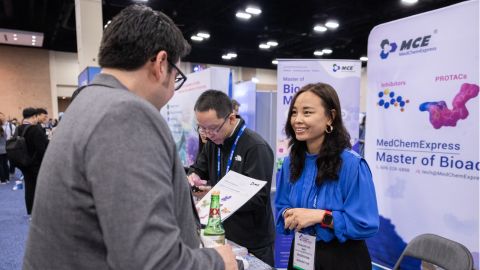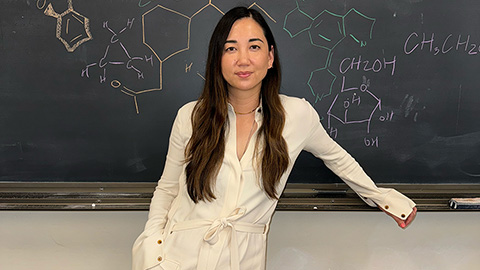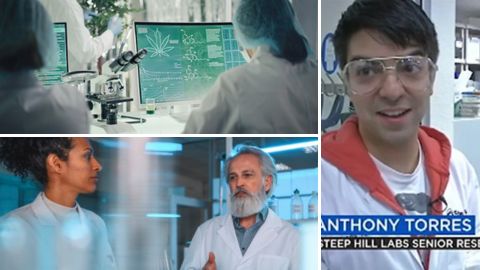'Very, very luckily for me, this project is going well'
Vijayakanth Pagadala was a postdoc in Jian Liu’s lab at the University of North Carolina at Chapel Hill when he got an exciting opportunity: running the science at Liu’s startup, Glycan Therapeutics. He’s been there for five and a half years, working on in vitro production of a glycan drug that currently comes from animal sources. This interview has been condensed and edited.

Name: Vijayakanth Pagadala
Current position: Principal scientist, Glycan Therapeutics
Career path: Ph.D.: Rosalind Franklin University, 2009
Postdoctoral research: National Institute of Environmental Health Sciences, 2009-2013; University of North Carolina at Chapel Hill, 2013-2015
Favorite molecule: Adenosine triphosphate synthase. “It is the most fascinating molecule.”
Glycan makes synthetic oligosaccharides. What are they useful for?
We’re trying to produce synthetic heparin. Heparin is the oldest and best known anticoagulant, a blood-thinner injectable that is purified from animal gut. It is made from cheap, easily available raw material, manufactured on a scale of tons. But there have been instances where contaminated heparin killed people. Also, 80% of global heparin comes from pigs, and swine flu is decimating the pig population, which risks the supply chain. Pharmacologically, the synthetic drug we are making is a single-molecule entity, whereas heparin is a mixture of approximately 30 different oligosaccharides.
Do you spend most of your time engineering heparin and heparin-producing enzymes?
I want to spend more time on engineering, but there are some financial and deliverable constraints that won’t let me. I am working on optimizing production: how to grow cells, how much protein we get out of each batch, how much starting material we can convert into product, how many rounds of synthesis we can do in a year and so on. I do some process engineering, some enzyme engineering and strain screening. In the near future, I hope that we’ll tie up with some bioprocessing giant where enzyme engineering and production is a push of a button.
What made you want to work at a startup?
A confluence of factors and being in the right place at the right time. I’m happy I made the choice to join a startup. Very, very luckily for me, this project is going well. Unfortunately, only one in 10 postdocs get a chance for an equitable share of the academic research pie. I think I will continue to be in entrepreneurship, because you can come out with real, life-changing products.
You’re the PI on a couple of Small Business Innovation Research grants. How do they compare to academic funding?
In a way, there is a simpler scientific goal in the SBIRs. But reproducibility, scalability and execution have to be 100% or else the product will fail. The emphasis is on execution and commercialization rather than proof of concept.
What skills have you needed to develop on the job?
People skills. You can work in relative isolation in a big lab. But in a small startup where you build everything from scratch, everybody in the team has to work with each other and wear multiple hats. Academics do wear a lot of hats, but, generally, people skills are less important in an academic lab. Also, a deep-seated can-fix-anything mentality is critical for navigating the demands of a job in a startup.
(Would you like to suggest an ASBMB member who works in industry for a Five Questions interview? Send an email to ASBMB Today.)
Enjoy reading ASBMB Today?
Become a member to receive the print edition four times a year and the digital edition monthly.
Learn moreFeatured jobs
from the ASBMB career center
Get the latest from ASBMB Today
Enter your email address, and we’ll send you a weekly email with recent articles, interviews and more.
Latest in Industry
Industry highlights or most popular articles

Black excellence in biotech: Shaping the future of an industry
This Black History Month, we highlight the impact of DEI initiatives, trailblazing scientists and industry leaders working to create a more inclusive and scientific community. Discover how you can be part of the movement.

Attend ASBMB’s career and education fair
Attending the ASBMB career and education fair is a great way to explore new opportunities, make valuable connections and gain insights into potential career paths.

Benefits of attending a large scientific conference
Researchers have a lot of choices when it comes to conferences and symposia. A large conference like the ASBMB Annual Meeting offers myriad opportunities, such as poster sessions, top research talks, social events, workshops, vendor booths and more.

Biotech startup worms its way into therapeutics
Andrea Choe's company, Holoclara, has created an anti-inflammatory drug based on a molecule from worms.

How military forensic scientists use DNA to solve mysteries
Learn how two analysts at the Armed Forces DNA Identification Laboratory use molecular biology and genetics to identify the remains of fallen troops.

Careers in industry: A year in review
Careers columnist Inayah Entzminger looks back at 12 months of interviews, advice and lists of resources.

